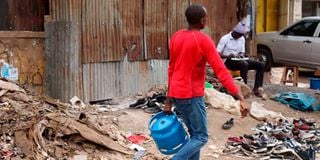Rising cooking gas prices push Kenyans to dirty fuels

A man carrying a cooking gas cylinder. The cost of cooking gas has been on an upward trend since the introduction of 16 per cent tax.
The use of charcoal and kerosene has shot up as Kenyans turn to dirty fuels following an increase in cooking gas prices by nearly 50 percent since January last year.
The latest data from the Kenya National Bureau of Statistics (KNBS) shows that kerosene consumption rose to a five-month high of 10,070 tonnes in November from the 8,730 tonnes consumed in July.
Charcoal prices have also increased from Sh58.7 for a 4-kilogramme tin to Sh60.7 for the same quantity indicating the rise in demand for the carbon-based fuel.
Approximately 70 percent of households in Kenya still use wood stoves as either their primary or secondary cook-stoves, with a prevalence of 92 percent in rural areas.
This corresponds to 64.7 percent (equivalent to 8.1 million) of households in Kenya using wood as their primary cooking fuel.
Clean Cooking Association of Kenya CEO David Njugi said they are planning to do a study in February to check if Liquefied Petroleum Gas (LPG) sales have gone down since the 16 percent Value Added Tax (VAT) was introduced to be able to quantify the shift to dirty fuel.
"We are having a challenge transitioning to LPG, those who have been using LPG are complementing it with charcoal and other biomass, what we call dirty fuel and some have stopped completely especially the rural areas and poorer households," he said.
Cooking gas prices have jumped 48 percent to an eight-year high of Sh2,978 for a 13-kg cylinder as the exclusive club of suppliers and distributors used introduction of new taxes to pump up prices.
A spot check showed that a 13-kg gas from Total was retailing at Sh2,995, Rubis K-gas at Sh2,950 and Shell/Vivo’s Afrigas Sh2,990.
Cooking gas prices are not controlled unlike petrol, diesel and kerosene with the government stating price controls on LPG will deter investors from coming into the sector.
The government has been promising to control for over a decade after the handling and storage facility under construction in Mombasa is complete.





